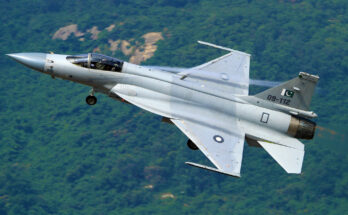Top officials in U.S. President Donald Trump’s administration appear to be pushing for the president to use an emergency measure to conclude arms sales with Saudi Arabia and the United Arab Emirates, despite a congressional freeze on the transfer of certain weapons.
In a report on May 23, 2019, The New York Times said that U.S. Secretary of State Michael Pompeo, as well as other State Department officials, are asking for President Trump to bypass a congressional block on the sale of military equipment to two Gulf partners. Reportedly, the deals “include precision-guided munitions and combat aircraft,” which have been ensnared amid congressional pressure on the Trump administration over the Saudi-led campaign in Yemen.
Iran is a likely factor in the administration’s deliberations. The push for the sales comes amid renewed tension between the U.S. and Iran. Both Saudi Arabia and the UAE are rivals of Iran and are currently involved in military operations in Yemen, where they are fighting the Iranian-supported Ansar Allah rebel group. In a noteworthy detail, the policy director for the activist group Win Without War, Kate Kizer, told Al-Monitor in regard to the administration’s push for arms sales to the Gulf countries, “My understanding from multiple contacts is that the emergency he’s citing is going to be Iran and the emergency in the Gulf.”
According to the New York Times report, the stalled sales are worth a combined $7 billion. It has been previously indicated that $2 billion worth of precision-guided munitions for Saudi Arabia is on hold, with another $1 billion of the same type of weapons for the UAE also being frozen.
While it has been extensively reported over the last year that the Congress — led by Senator Robert Menendez (D-N.J.) — is blocking a proposed sale of precision-guided munitions to the two countries, it has not been previously revealed that the freeze includes combat aircraft. The news incidentally enough confirms that one (or both) of the countries is actively seeking procurement of such aircraft from the U.S.
Presumably, the congressional hold on the aircraft does not apply to ongoing deals. Bloomberg reported last month in regard to Senator Menendez’s block:
Under a 1976 law, the State Department must notify Congress of commercial arms sales that exceed certain thresholds for ammunition, defense construction or defense articles and services. If the top Republican or Democrat on the House Foreign Affairs and Senate Foreign Relations Committees have any concerns, they can place an informal hold on the sale by refusing to consent to the notification process.
The notification process occurs well prior to the actual signing of a contract for a military system.
No further details on the “combat aircraft” were provided. The value of the items would likely be a ceiling of $4 billion, though could fall short of that figure depending on whether any other major hardware is being frozen as well.
There are several possible options as to what “combat aircraft” might be on hold:
- Fighter Jets. Saudi Arabia is currently importing the F-15SA, an advanced version of the F-15, under a contract completed years ago, and isn’t known to be considering a follow-on buy of more of the jet from the U.S. (Admittedly, with the Eurofighter Typhoon follow-on order stalled over a German arms export ban, that could have changed.) The UAE, however, is interested in the long term in procuring up to two dozen F-35s. Washington probably will not sign off on the sale of the advanced stealth fighter to Abu Dhabi just yet, but it has previously been rumored that the UAE might procure F-15s as an interim step ahead of later acquiring the F-35.
- Light Attack Aircraft. The UAE, in particular, has made extensive use of IOMAX Archangel aircraft in its counterinsurgency operations, including in Yemen, and has been considering additional procurement of the type. Saudi Arabia, meanwhile, is also interested in light attack aircraft, either Archangels or other systems geared toward counterinsurgency missions. In a June 2017 report on proposed U.S.-Saudi arms deals, Defense News noted that the U.S. has offered $2 billion worth of “light close air support” aircraft to Saudi Arabia.
- Attack Helicopters. As “combat aircraft” is a vague term, it is possible that the reference also includes attack helicopters. Both Saudi Arabia and the UAE have already ordered AH-64 attack helicopters from the U.S., and Abu Dhabi completed a contract after Senator Menendez’s hold went into place, making it less likely, though still possible, that the hold involves these sorts of aircraft.
Absent further information, however, it is not clear which of these are under discussion, or for which party if not both.
UPDATE (May 24, 2019, 2:00 PM): The American media outlet CNN reported later on Friday that the proposed arms package includes surveillance aircraft — such as the RQ-21, a reconnaissance drone — which, if confirmed, would clarify the New York Times reporting and indicate that armed aircraft are not currently under discussion.
A US official tells CNN that the expedited arms packages for UAE and Saudi Arabia will include surveillance aircraft (to include RQ-21 Blackjack drones), aircraft maintenance, training programs, advanced precision kill weapon guidance systems & Javelin anti-tank missiles https://t.co/xJOQ1VDJ1L
— Ryan Browne (@rabrowne75) May 24, 2019
Military markets analyst, covering Eurasia, Middle East, and Africa.




